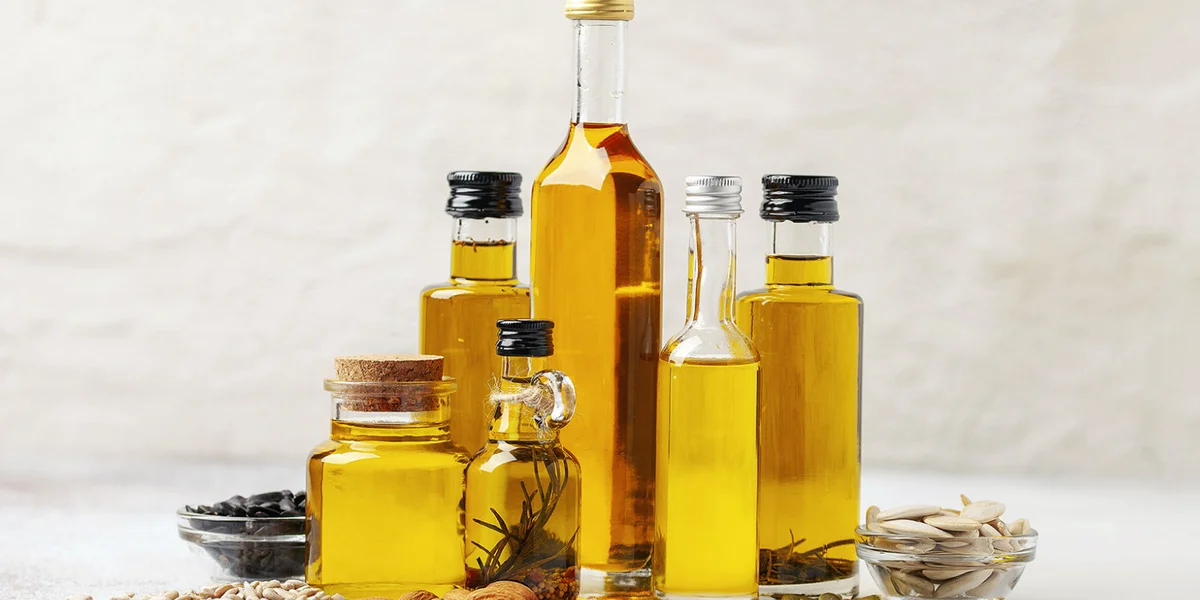
8 Types of Cooking Oils and When to Use Them
Cooking oil choices seem endless. Olive, canola, peanut, and more—learn which oils are the best for your health.
A walk through the cooking oil section of grocery stores today can feel a little overwhelming. With dozens of choices, it can be difficult to determine which oils will have the best health benefits or fit your food prep needs. This overview can help you decide what to stock in your kitchen cabinet.
Types of Cooking Oils and When to Use Them
Nutrition experts agree that everyone should avoid vegetable shortening and hard-stick margarine and only consume butter and lard in moderation if your doctor gives the OK. You can replace solid fats with a cooking oil that is suited to your style of cooking, tastes, and health goals.
There are several factors to consider when choosing the best cooking oil, including how hot or how long you will be cooking the food and the smoke point of the oil. When heated to a high temperature, some oils can start to break down and create unhealthy compounds that can be harmful to your health. If oil begins to smoke in a pan, it’s a sign it is too hot and is starting to break down.
Find out which oils stand up to heat and learn about different types of cooking oil fat content, taste, and more in the list below.
Olive oil
Extra-virgin olive oil has heart-healthy monounsaturated fats and anti-inflammatory properties that can lower LDL cholesterol. Because it’s not refined (exposed to high heat), extra-virgin olive oil is often considered the healthier type of olive oil. Regular or light olive oil has a higher smoke point and can be used for searing and pan-frying, but it has fewer antioxidants and is more processed than extra-virgin olive oil. Extra-virgin olive oil has a lower smoke point, so is better suited for making salad dressing, drizzling on pasta, or using with foods that are cooked at a low heat.
Canola oil
Canola oil is low in saturated fats and can be heated to a range of 400 to 450 degrees. It also has a more subtle flavor than some of the other cooking oils. Canola oil contains plenty of healthy omega-3 fats. One downside to the oil is that it can start to taste or smell slightly fishy as it ages. Generally, canola oil lasts six months to a year after opening and about two years unopened.
Peanut oil
Peanut oil is great for frying and stir-frying because it can withstand high heat before it starts to break down. It generally has a neutral or slightly nutty flavor. Peanut oil is also a good source of vitamin E and antioxidants as well as heart-healthy monounsaturated fats, but is best used in moderation.
Avocado oil
Like olive oil, avocado oil is high in monounsaturated fats, which are considered heart healthy. Avocado oil is ideal for baking because it has very little flavor. Refined avocado oil has a smoke point of 520 degrees (great for roasting veggies in the oven) and unrefined has a smoke point of 375 degrees. One other thing to consider: Avocado oil can be one of the more expensive oils.
Sunflower and safflower oil
Sunflower and safflower oil come in two versions: regular (traditional) or high oleic. The high-oleic versions are healthier because they include monounsaturated fats in addition to polyunsaturated fats. If you have regular sunflower or safflower oil, it’s best to only use it once in a while since it is high in omega-6 fatty acids, which may lead to inflammation, according to some studies.
Corn, soybean, and other vegetable oils
Vegetable oil is typically made up of corn or soybean oil, or a blend that may include canola, corn, soybean, cottonseed, or sunflower oil. While these oils are healthier than solid fats, they do not have the health benefits of monounsaturated fats that are found in olive, avocado, peanut, and canola oil. Because vegetable oils have a high smoke point, they work well for stir frying, roasting, or baking.
Coconut oil
Coconut oil should be used in moderation because it has more saturated fats than many of the other plant oils above. While many people have praised the health benefits of medium chain triglycerides found in coconut oil, these fats are actually a low percentage of the oil. Coconut oil does have other beneficial uses and can make for a great moisturizer for skin and hair.
How to Use Cooking Oils
Once you’ve found your favorite oils, there are several different ways to use them.
- Make your own salad dressings with extra-virgin olive oil.
- Coat pans to prevent sticking. Be sure to select an oil that has a smoke point and matches your cooking method and heat level. Canola oil and avocado oil are good choices.
- Substitute oil for butter in recipes. Canola oil and avocado oil are ideal for baking due to their subtle flavors and ability to withstand higher temperatures. Coconut oil can also be used for baking.
- Stir fry or saute with oils that withstand higher heat, such as peanut, canola, sunflower, or avocado oils.
- Drizzle extra-virgin olive oil over pasta or cooked vegetables.
- Use extra-virgin olive oil as a dip for breads, replacing butter or margarine.
Looking for more health tips? Explore our latest blogs for practical tips to make healthier choices and get the most from your Medicare benefits.
Don’t forget to follow us on Facebook for updates and additional resources!
This article was medically reviewed by Dr. Kumar Dharmarajan.


